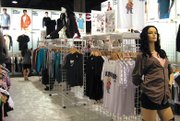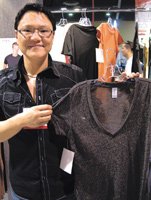Imprinted Sportswear Show Makes Its Mark
Just when you think you’ve seen everything in the T-shirt business, along come a few twists and turns that catch your attention.
Take, for example, Alstyle Apparel’s new T-shirt size. In the past, the Anaheim, Calif.–based company has carried all its tops in everything from extra small to 5XL (XXXXXL). But this year, the company has gone one better. It now has a 6XL (XXXXXXL) T-shirt that looks more than ample. It’s HUGE.
Or there is Pima Apparel, which no longer uses Pima cotton in its T-shirts because of the luxury fiber’s rising price. The Ontario, Calif.–based company is experimenting with a new linen/polyester blend that delivers a textured look to a T-shirt. The company whipped up a batch of 6,000 shirts that wholesale for $4.20 each. Already, Pima Apparel has sold half that stock even though the shirt costs about $1 more than a cotton T-shirt.
Alstyle Apparel and Pima Apparel were just two of the nearly 350 companies that crowded into the Long Beach Convention Center in Long Beach, Calif., for the Jan. 21–23 run of the Imprinted Sportswear Show, one of the largest West Coast events for the decorated-apparel industry.
The three-day event had seminars on everything from “Embroidery Gone Bad” to “Eating Your Competitors and Capturing Their Customers.”
The convention floor was filled with scores of blank T-shirt makers and distributors who often sell their product to the screen-print market. The show was crammed with a dizzying array of digital-printing equipment as well as machinery that embroiders, screen-prints and adds rhinestone embellishments.
The buzz on the show floor was indicative that this was a popular show with brisk business that many reported was better than last year. That was seen at the Alstyle Apparel booth. “We scanned a record number of people coming into our booth,” said Jim Gordon, Alstyle’s West Coast regional sales manager. “We had some of our most important customers there.”
This year, Alstyle decided not to roll out a host of new colors or products, concentrating instead on the cotton issue and how its high price is affecting the T-shirt business. “We are more focused on making sure we have availability of product in a year that will be difficult sourcing cotton and yarn. We are making sure we have cotton on hand,” Gordon said.
Alstyle is also concentrating on a new $54 million factory it is building in Agua Prieta, Mexico, near the U.S. border and Douglas, Ariz. When the 700,000-square-foot factory is fully operational in 2012, production will be wound down at its factory in Anaheim, Calif.
The Mexican factory will be capable of producing 1 million T-shirts a day and will save the company between $10 million and $15 million a year through manufacturing efficiencies, according to documents the company filed with the Securities and Exchange Commission.
Alstyle believes the new factory will be able to deliver goods quickly to the U.S. market and outpace shipments from its competitors’ factories in places such as Central America and Asia.
Another large T-shirt producer at the show was Gildan Activewear of Montreal, Canada, which unveiled eight new shades for the company’s T-shirt line and a few new styles. The new colors ranged from Tennessee orange and aubergine to heather sapphire and old gold. New styles included the 4.5-ounce soft-style collection now in men’s and women’s long-sleeve T-shirts.
Gilles Leger, the company’s vice president of finance, said Gildan’s traditional bestseller is the Style 2000 T-shirt, which comes in 61 colors.Adding newness
Triblend T-shirts were making an aggressive appearance on the show floor. The move is in response to cotton prices that recently were pegged at $1.62 a pound for March delivery.
American Apparel, whose factory and head offices are in downtown Los Angeles, has a triblend, V-neck T-shirt that is 50 percent polyester, 25 percent cotton and 25 percent viscose.
Bella, also based in Los Angeles, features a triblend that is 50 percent polyester, 37.5 percent cotton and 12.5 percent rayon.
Pima Apparel took the all-natural route to triblend with bamboo, cotton and soybean fiber.
In addition to the rollout of triblend tops, there was a bevy of new styles and products displayed.
American Apparel was showcasing its new interlock pencil skirt, which wholesales for $5.50, and a cotton/spandex double-U jersey dress that hugs the body and wholesales for $7.
“Sublimation is the biggest new thing for us at the show,” said Mark Smalley, part of American Apparel’s marketing department. American Apparel is also making T-shirts and tops out of fabric with moisture-wicking capabilities and odor guard.
For Bella, the addition of misses sizes is a new direction for the company. “We had many requests for that,” said Sarah Smith, a Bella sales associate.
In addition, the apparel company is introducing a new unisex collection of tees, sweatshirts and hoodies as well as a fashion-forward collection of long-sleeve dolman tees and lightweight flowy tees that go well with leggings and jeggings.
At Cotton Culture, a Los Angeles company that used to be called Simply Cotton, low minimums of 600 per body style is a key selling point. Another advantage is the company does all its production in Los Angeles. “We make the blanks to the customer’s specifications and do custom garment dyeing,” said Mitch Malek, president of sales. “Treatments are real important.”























